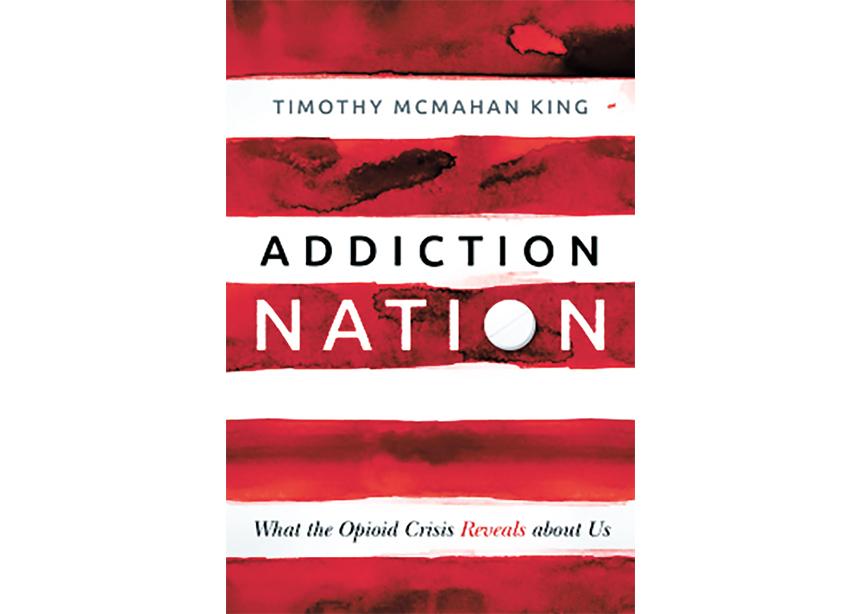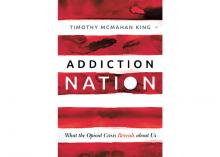Timothy King found himself addicted to opioids when complications after surgery led to intense pain and serious illness. In Addiction Nation, he describes what it feels like to be trapped in a cocoon of addiction and how he was able to achieve recovery with the help of a kind doctor and a supportive family.
Although he uses personal experience, this book is not a memoir. King has researched addiction extensively and explores the world of compulsive drug use—how and why it happens, and what responses are helpful. An experienced writer, he describes complex ideas in an easy-to-read style. Throughout, he uses stories from the Bible to illustrate how Christian faith fits into the discussion.
For King, the opioid crisis is a symptom of a larger problem. He writes, “It is born out of a crisis of meaning, a collapse of culture, constant consumption, corporate corruption, the end result of a so-called War on Drugs, a breakdown of public institutions, and a stifling of opportunity.”
He points out that in the last 40-plus years North Americans have experienced an erosion in family and community life, and a corresponding sharp increase in overdose deaths. He argues that when life loses its meaning, drugs are a way to cope with the resulting distress.
One of the most important things that King’s doctor told him was that his addiction was not his fault; it did not happen because he was a bad person. This statement allowed King to move beyond blame and shame, and toward recovery.
The assumption that an addict is morally deficient is never helpful, declares King. Punishment and shame do not lead to recovery; they only make the addict crave the feeling of security the drug delivers, however short-term that may be. The disease model that compares addiction to diabetes or heart disease is a better approach, he says, but the reality is even more complex. Just as there is no single cause for the opioid crisis, there is no simple solution to it.
Our brains are complex, and decisions are made by both the “automatic” self and the “conscious” self, says King. He writes, “It is a breakdown in communication between the automatic self and the conscious self that is at the core of addiction,” explaining why it is not effective to just choose not to take drugs. When habits become ingrained and are attached to emotions, conscious decisions have little influence.
King explores the history of drug use and the history of pain medications. He is scathing of Purdue Pharma, the company that misled doctors about the addictive qualities of opioids for years and used aggressive marketing to push Oxycontin. The result has been skyrocketing abuse of opioids. At the same time, King recognizes that medication has a vital role to play in dealing with acute pain. Opioids are both a beneficial medicine and a harmful poison.
Throughout Addiction Nation, King cites various studies discussing the factors that influence addictions. Although it is not a guarantee, those who feel secure in their homes and families are better equipped to keep addiction out of their lives. Dislocation and trauma, on the other hand, increase the attraction of drugs.
Another factor that influences our tendency to addiction is whether or not we feel we are in control of our lives. Those who have little control and few choices are more vulnerable. He argues that drug dependence begins not as a rejection of morality, but as a search to satisfy a need that is lacking. It is the pursuit of something good that ends up backfiring.
“Addiction’s power is how it mixes the truth and lies. The devil doesn’t come with a pitchfork, hooves and the smell of sulfur; the devil comes as an angel of light,” writes King. He explains that the path to addiction is a search for meaning in life, for connection with others, or for safety, but in the end the path leads to destruction.
The power of this book is King’s honesty and willingness to be vulnerable. He shows that addiction is not something that happens to others, to “them.” All of us are susceptible to addiction, and dependence comes in many forms. Rather than viewing it as an individual moral failing, we should view it as a cancer growing in our society. As his title indicates, this crisis is a community problem.
King writes with compassion from an openly Christian perspective. He does not say that a simple faith in God can triumph over addiction, but he explains how faith in God can help in the recovery process. I recommend this book for anyone interested in knowing more about addiction and the opioid crisis.
Further reading:
Who is my neighbour? Exploring the church's response to the opioid crisis




Add new comment
Canadian Mennonite invites comments and encourages constructive discussion about our content. Actual full names (first and last) are required. Comments are moderated and may be edited. They will not appear online until approved and will be posted during business hours. Some comments may be reproduced in print.